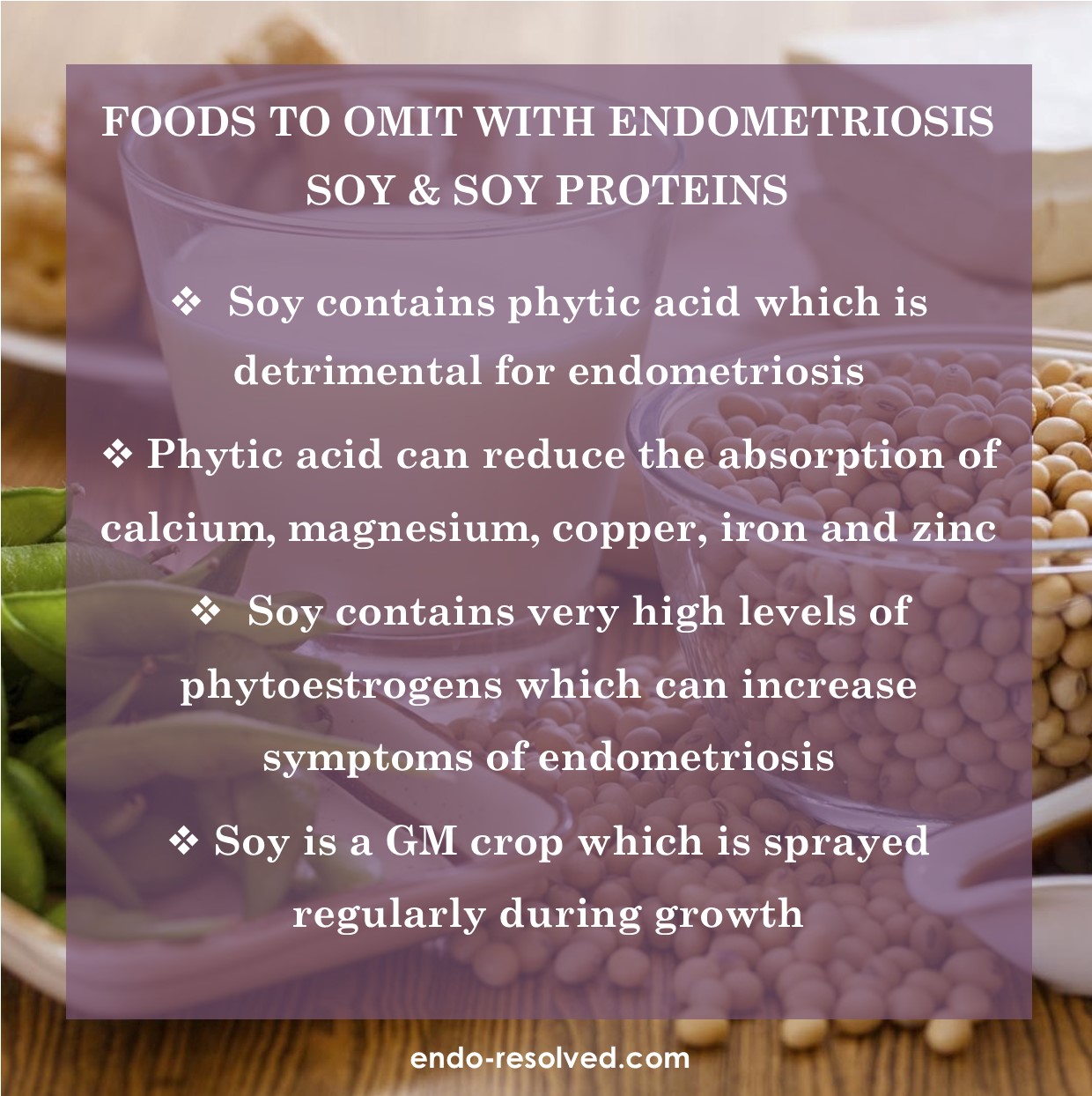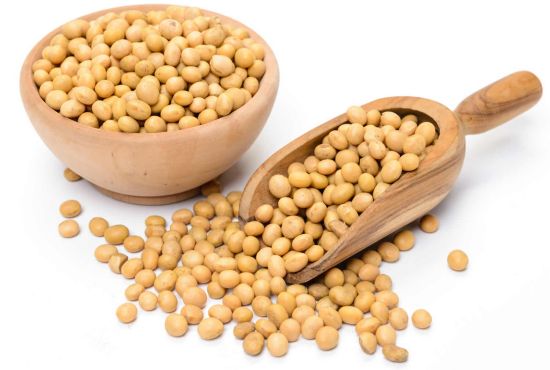Why soy is bad for endometriosis
There seems to be contradictory advice in the endometriosis community regarding the safety of including soy in your diet. The relationship between soy and endometriosis is complex, with research showing conflicting results. Some studies suggest soy is bad because its phytoestrogens can mimic estrogen, while others indicate it may be beneficial by having an anti-estrogenic benefit. So research is inconclusive.
But the issue of the safety of including soy in your diet when you have endometriosis goes beyond just the estrogenic properties of soy. Most discussions regarding this topic seem to focus on the use of soy based alternative foods like soy based burgers and soy proteins added to ready meals. But the production processes of these soy based foods leaves much to be desired which includes the use of many processes and chemicals.
In principle soy products will upset your natural hormone balance because soy contains very high levels of phytoestrogens which will mimic our own estrogen hormones.
Having some phytoestrogens in our diet can be beneficial as they are thought to block our estrogen receptors and help to reduce excess estrogens from circulating in our system. But having too many phytoestrogens can tip the balance.
But the problem with soy goes beyond the issue of phytoestrogens. Soy can cause many negative health problems which seems to be worse for those with endometriosis.
It is worth noting that soy can have a very detrimental affect for those who have thyroid auto-immune Hashimoto's which can trigger a flare of the disease and increase thyroid anti-bodies
Some of these problems include:
- Hormone imbalances
- High levels of omega 6 which can cause inflammation
- High levels of phytic acid in soy reduce assimilation of calcium, magnesium, copper, iron and zinc
- Levels of soy phytoestrogens disrupt endocrine function and have the potential to cause infertility and to promote breast cancer in adult women.
- Soy foods contain high levels of aluminium which is toxic to the nervous system and the kidneys
- Soy foods increase the body’s requirement for vitamin D
- The various negative effects of soy weaken the immune system.
- Ninety one percent of the soy grown in the United States is genetically engineered and is regularly sprayed with pesticides – all of which are detrimental to health

Many who change their old diet for a diet to control endometriosis will sometimes be replacing the dairy and protein foods and substituting them with soy products. These can include soy milk, soy spreads, soy cheeses, soy-based burgers and substitute meats, and many other alternative soy products. You need to avoid all modern soy-based foods and food substitutes.
The only safe soy foods are those that come from eastern traditions of fermented foods like miso, tempeh and tamari. These foods are safe enough for the healthy person, but for women with endometriosis their consumption needs to be minimal because of the high levels of phytoestrogens.
Below are feedback comments from women with endometriosis and their experiences of using soy:
‘I had a very late diagnosis of endometriosis after having pain for 20 years. At the age of 46 I had a laparoscopy which confirmed endo and the surgeon used diathermy to burn a lot of the plaques off of my ovaries, fallopian tubes and uterus. Within 4 days of the surgery I began to have menopause symptoms. After trying HRT and suffering more endo symptoms I decided to stop using it.
I have been post-menopausal for 13 years. Fast forward to this January when I decided to use a Soya meal replacement diet. Within 3 months my previously dormant fibrocystic breast disease returned (diagnosed on a routine mammogram) and I now have pelvic pain which feels just like the endo which has been dormant through the last 12 years. I also managed to have a recurrence of hashimotos thyroid symptoms which had also been under control for the last 10 years.’
‘I was just reflecting on whether or not soy had triggered my Endo when I came upon this post. In my early 20s I took to having daily soy protein shakes to lose weight and while it did help with the weight loss my Endo symptoms truly began around this time. I have only recently started to learn about the links to soy and estrogen response and now I am almost certain that this was a major contributing factor to my Endo.’
‘Several years ago, a naturopath recommended that I switch to soy and avoid dairy. Within weeks I stopped ovulating and just bled for weeks without relief, I truly believe soy disrupted my hormones and created oestrogen excess – being a PCOS sufferer with mild Endo, I was already battling oestrogen dominance so switching to soy was the worst thing I could have done.’
You can see from the comments above that omitting soy from your diet when you have endometriosis is an important factor to ensure you do not make your symptoms worse. There are plenty of other alternatives to getting sufficient protein in your diet if you are reducing your intake of animal-based proteins which you can read about HERE.

About the Author
Hi, I am Carolyn Levett, the Founder here at endo-resolved - I am an Integrative Health Coach having studied nutrition, naturopathy and aromatherapy as well as being a published author of three endometriosis books. I used to suffer from severe endometriosis and was fortunate to be able to regained my health and recover from this disease with the support of nutrition, natural therapies and lots of determination.
My motivation is to help other women with endometriosis to heal their bodies so they may start to overcome this awful disease without having to totally rely on toxic drugs and surgeries which can cause further damage - with healing thoughts, Carolyn.
Reference:
https://www.liebertpub.com/doi/abs/10.1089/jmf.2018.0160
https://www.endofound.org/10-foods-endo-women-should-avoid
https://www.jstor.org/stable/20486384?seq=1#page_scan_tab_contents
Zhong XS, et al. Association between Dietary Isoflavones in Soy and Legumes and Endometrial Cancer: A Systematic Review and Meta-Analysis. J Acad Nutr Diet. 2018;118(4):637-651.
suchiya M, et al. Effect of soy isoflavones on endometriosis: interaction with estrogen receptor 2 gene polymorphism. Epidemiology. 2007;18(3):402-408. https://www.ncbi.nlm.nih.gov/pubmed/17474167. Accessed February 9, 2020.
Upson K, et al. Soy-based infant formula feeding and menstrual pain in a cohort of women aged 23-35 years. Hum Reprod. 2019;34(2):148-154. https://www.ncbi.nlm.nih.gov/pubmed/30412246. Accessed February 9, 2020.
Mvondo MA. Soy Intake Since the Prepubertal Age May Contribute to the Pathogenesis of Endometriosis in Adulthood. Journal of Medicinal Food. 2019;22(6). https://www.liebertpub.com/doi/full/10.1089/jmf.2018.0160. Accessed February 9, 2020
Tsuchiya, M., Miura, T., Hanaoka, T., Iwasaki, M., Sasaki, H., Tanaka, T., … Tsugane, S. (2007). Effect of Soy Isoflavones on Endometriosis. Epidemiology, 18(3), 402–408. doi:10.1097/01.ede.0000257571.01358.f9
Mumford, S. L., Weck, J., Kannan, K., & Buck Louis, G. M. (2017). Urinary Phytoestrogen Concentrations Are Not Associated with Incident Endometriosis in Premenopausal Women. The Journal of nutrition, 147(2), 227–234. doi:10.3945/jn.116.238840
 As featured in:
As featured in:





